
Outcome-Based Education (OBE) has emerged as a pivotal approach in modern educational frameworks, emphasizing the desired results of the learning process rather than the mere delivery of content. This method focuses on what students should be able to demonstrate by the end of an educational program, fostering a more student-centric learning environment. As the landscape of education evolves, integrating innovative technologies, such as Generative AI, into teaching and research has become increasingly essential.
The current educational landscape is marked by a significant shift towards remote and hybrid learning models. Generative AI can facilitate these models by providing intelligent tutoring systems that offer instant feedback and resources tailored to individual learners. This immediate support fosters a more effective learning environment, where students can progress at their own pace and receive assistance whenever needed.
The core principle of OBE lies in aligning educational objectives with the needs of students and society. By clearly defining learning outcomes, educators can create targeted assessments that measure student performance effectively. This shift towards a results-oriented approach not only enhances accountability in educational institutions but also ensures that graduates possess the skills necessary for the workforce.
Furthermore, OBE and generative AI can enhance research methodologies in higher education. By analyzing vast amounts of data, AI can identify trends and insights that might otherwise go unnoticed. This capability enables researchers to focus on outcome-driven investigations, producing results that are relevant and applicable to real-world issues. Such synergy between OBE and AI encourages a culture of continuous improvement and innovation in research practices.
In research, Generative AI can streamline processes, aiding researchers in generating hypotheses, analyzing data, and even drafting manuscripts. This technology empowers scholars to focus on higher-order thinking and creativity rather than getting bogged down in repetitive tasks. Consequently, the application of Generative AI can lead to more innovative research outcomes, driving progress across disciplines. AI-driven platforms can facilitate group projects by optimizing team dynamics, ensuring that each member contributes effectively based on their strengths. This collaborative approach not only enriches the learning experience but also prepares students for teamwork in their professional lives.
Generative AI, with its ability to create new content, offers exciting possibilities in both teaching and research. It can assist educators in developing personalized learning experiences and tailoring materials to meet individual student needs. This adaptability can help engage diverse learners, addressing various learning styles and paces, ultimately enhancing the overall educational experience. The current educational environment, shaped by rapid technological advancements and changing job market demands, calls for a reevaluation of traditional teaching methods. Incorporating OBE principles and Generative AI aligns with this need for agility and responsiveness in education. By fostering critical thinking and problem-solving skills, this integrated approach prepares students to thrive in an increasingly complex world.
Moreover, the application of OBE in conjunction with Generative AI encourages collaborative learning environments. Students can engage in projects that harness AI tools, fostering teamwork and communication skills essential for success in the 21st-century workplace. This collaboration not only enhances student engagement but also promotes a deeper understanding of the subject matter.
In conclusion, the importance of Outcome-Based Education and the application of Generative AI in teaching and research cannot be overstated. Together, they create a dynamic educational framework that prioritizes student outcomes while leveraging cutting-edge technology. This integration not only meets the demands of today’s learners but also prepares them for the challenges of tomorrow’s workforce. As educational institutions continue to adapt, embracing these approaches will be crucial in shaping future generations of skilled and innovative professionals.
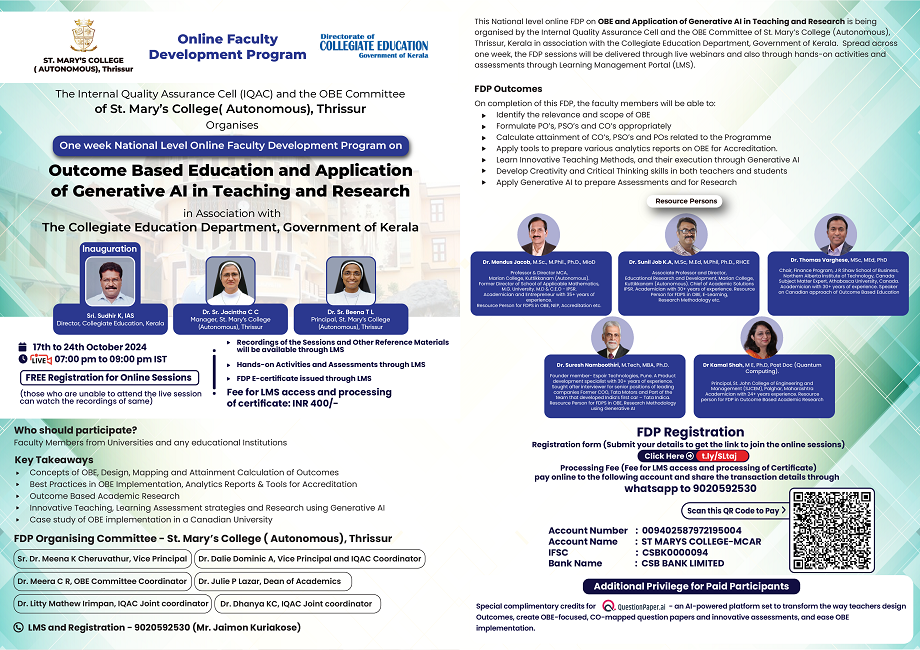
Participants in the Faculty Development Programme include Deans, Heads of Departments, and Faculty Members from Higher Educational Institutions across the Indian States and abroad.
2798 participants took part and benefitted from the seven-day Faculty Development Programme on Outcome Based Education and Application of Generative AI in Teaching and Research organised by the Internal Quality Assurance Cell of St Mary’s College, Autonomous, Thrissur in association with the Directorate of Collegiate Education, Government of Kerala.
Day 1: 17 October 2024: Inauguration
The inaugural session of the one-week National Level Online Faculty Development Programme on Outcome Based Education and Application of Generative AI in Teaching and Research started at 7.00 PM on 17 October 2024. The online session was organised by the Internal Quality Assurance Cell of St Mary’s College, Autonomous, Thrissur in association with the Directorate of Collegiate Education, Government of Kerala.
Welcome Speech:
Dr Dalie Dominic A, Vice Principal and IQAC Coordinator of St Mary’s College Autonomous, Thrissur delivered the Welcome Address. Dr Dalie was the Principal Coordinator for the KSCSTE-funded Science Popularisation Project ‘A Home for Tender Wings’. She currently leads the ‘Butterfly Eco-Park and Conservation Project’ at the State Museum and Zoo, Thrissur. Dr Dalie, a sought-after resource person and presenter, is also an author and editor of academic books.
Presidential Address:
Dr Sr Beena TL, Principal, St Mary’s College, Autonomous Thrissur gave away the Presidential Address. Sr Beena a distinguished educator and administrator has served as the Dean of Students Welfare and as the Head of the Department of Malayalam. She is also a writer and editor who contributes significantly to academic literature and the film on St Euphrasia. Dr Sr Beena has received the Excellent Paper Award during the International Conference in Thailand and the International Tagore Award.
Inaugural Address:
Dr Sunil John J, Additional Director, Directorate of Collegiate Education, Thiruvananthapuram delivered the Inaugural Address during the first day of the one-week online National Faculty Development Programme on Outcome Based Education and Application of Generative AI in Teaching and Research. Dr Sunil has served in many prestigious institutions before his current position as Additional Director. He is also a member of the Indian Sociological Society and the executive member of the Association of the Third World Studies, South Asian Chapter.
Introduction of the FDP:
Dr Mendus Jacob, MD & COE of ipsr solutions limited, and Professor & Director of MCA, Marian College Autonomous, Kuttikkanam provided the introduction regarding the FDP to the participants. Dr Jacob has also served as a resource person for many National and International Seminars, Conferences and Faculty Development Programmes including UGC Sponsered Refresher Courses. Dr Jacob is associated with many educational institutions as Chairman, Member of various academic bodies and a mentor of many Higher Education Institutions in implementing Outcome Based Education. He is part of a team which has trained over 30000 faculty members on Outcome Based Education.
Word of Thanks:
Dr CR Meera, Controller of Examinations and the OBE Committee Coordinator delivered the Word of Thanks. Dr Meera, with over 15 years of teaching and research experience holds a PhD in Microbiology. She served as the Head of the Microbiology Department at Sr Mary’s College from 2010 to 2023. She received the Best Faculty Award for Excellence in Teaching, coordinated UGC projects and seminars, contributed to NPTEL course translations and an international project on Mushroom Science funde by the Government of Australia.
Click to watch the video recording of the inaugural ceremony of the one-week Faculty Development Programme on Outcome-Based Education and Application of Generative AI in Teaching and Research.
Day 1 Technical Session:
Topic: Bloom’s Taxonomy – Learning Domains by Dr Sunil Job KA.
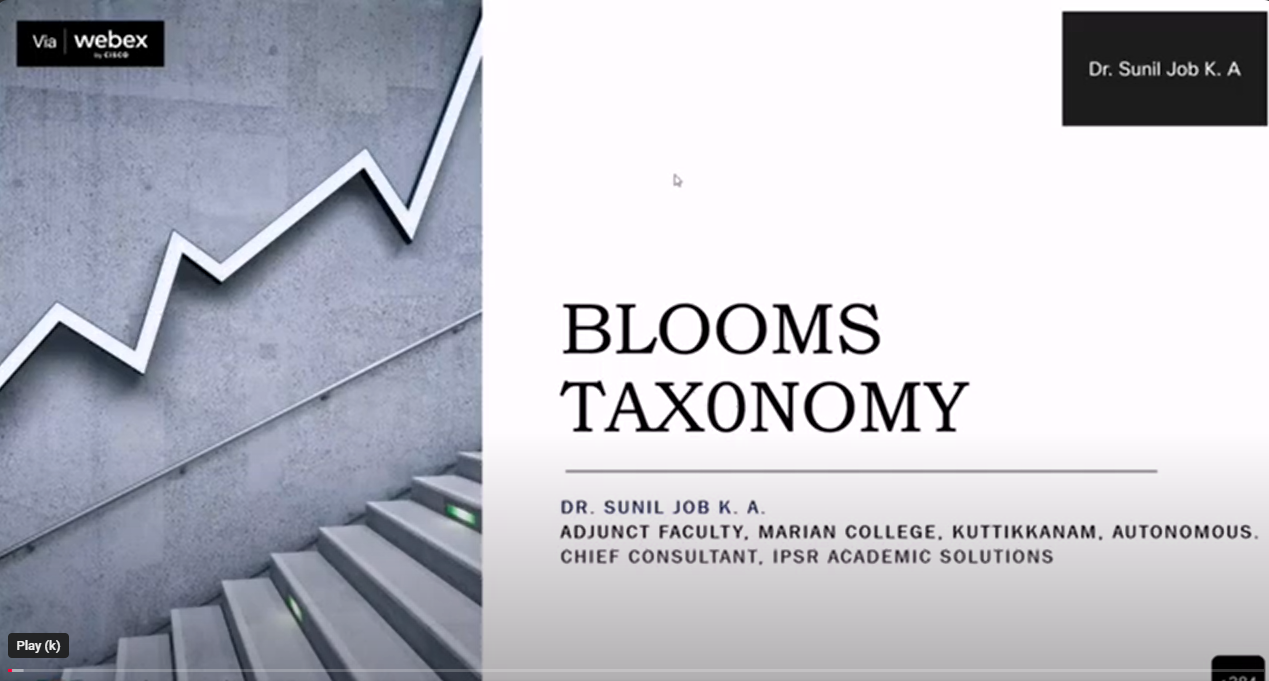
Bloom’s Taxonomy is a framework for categorizing educational goals, developed by Benjamin Bloom and colleagues in 1956. It divides learning into three primary domains: Cognitive, Affective, and Psychomotor. Each domain addresses a different aspect of human learning and development, making it a comprehensive tool for educators to structure learning objectives and assessments.
The Cognitive domain focuses on knowledge acquisition and intellectual skills. It ranges from basic recall of facts to higher-order thinking skills like analysis, evaluation, and creation. This domain is widely used in educational settings to guide the development of curricula and tests.
The Affective domain deals with emotions, attitudes, and values. It encompasses the way individuals react emotionally to learning experiences, including their motivations and feelings about the content. This domain is crucial in shaping learners’ attitudes and fostering a positive learning environment.
Lastly, the Psychomotor domain involves physical skills and motor functions. It emphasizes the development of coordination, precision, and manual dexterity, often used in disciplines like physical education, performing arts, and vocational training. Each domain offers a holistic approach to learning, ensuring well-rounded development.
By utilizing Bloom’s Taxonomy, educators can develop well-rounded curricula that engage students holistically, promoting intellectual growth, emotional intelligence, and practical skills while enhancing learning outcomes and fostering deeper understanding across disciplines.
The first task, Question Paper Analysis based on Bloom’s Taxonomy was assigned to the participants at the end of the first day’s session Bloom’s Taxonomy, Learning Domains by Dr Sunil Job.
Click to watch the video recording of the first day’s session, Blooms Taxonomy – Learning Domains by Dr Sunil Job.
Day 2 Technical Session:
Topic: Architecture of OBE & Design of Outcomes by Dr Sunil Job KA.
Outcome-Based Education (OBE) is a learner-centric educational framework that emphasizes defining and achieving specific outcomes. The architecture of OBE revolves around clearly articulated learning objectives that guide the curriculum, teaching methods, and assessment strategies. These objectives are aligned with the desired competencies students should acquire by the end of a program or course.
The design of outcomes in OBE involves identifying measurable performance indicators that reflect the mastery of skills, knowledge, and attitudes. These outcomes, typically categorized into program outcomes (POs) and course outcomes (COs), ensure that the learning process is transparent and focused. Instructors and institutions design their teaching methods, materials, and assessments to support the achievement of these outcomes directly.
OBE is structured to promote continuous improvement through feedback loops between assessments and learning outcomes. This allows educators to adjust teaching strategies and ensure students are progressing toward the intended goals. As a result, OBE creates a flexible, adaptive educational system that prepares students for real-world challenges and career readiness.
Effective OBE implementation relies on clearly defined, well-aligned outcomes that drive every aspect of curriculum design, teaching methodologies, and student evaluations. By centring education around outcomes, OBE ensures that learning is purposeful, focused, and directly tied to future professional and personal success.
The second task, Workshop Activity – Course Outcome and Quality Check was assigned to the participants after the second day’s session, Architecture of OBE, Designs of Outcomes by Dr Sunil Job.
Click to watch the video recording of the second day’s session, Architecture of OBE & Design of Outcomes by Dr Sunil Job.
Day 3 Technical Session:
Topic: OBE: Principles and Practical Implementation in a Canadian Context by Dr Thomas Varghese.
Outcome-Based Education (OBE) is a student-centred approach that focuses on achieving specific learning outcomes by the end of an educational experience. In contrast to traditional education models, OBE emphasizes what learners are expected to know, demonstrate, and apply after completing a course or program. This shift towards measurable competencies and skills prepares students for both academic success and real-world challenges, making it a popular model across various educational systems globally, including in Canada.
In the Canadian context, OBE aligns with national and provincial goals of developing highly skilled graduates ready for the workforce. It ensures that educational programs are structured to deliver clear outcomes that meet both academic standards and the demands of employers. The principles of OBE include designing curricula backwards from desired outcomes, continuous assessment to track student progress, and providing targeted feedback to help students achieve mastery.
Practically, implementing OBE in Canada involves close collaboration between educators, institutions, and industry to define relevant outcomes and adjust teaching methods accordingly. This requires ongoing curriculum revisions, regular assessment updates, and a commitment to evolving educational practices that reflect the needs of a rapidly changing global environment. The successful application of OBE enhances the accountability and transparency of the education system, ensuring that students acquire the competencies needed for their chosen careers.
Click to watch the video recording of the third day’s session, OBE: Principle and Practical Implementation in a Canadian Context by Dr Thomas Varghese.
Day 4 Technical Session:
Topic: Underlying Threads of OBE Generative AI in Teaching by Dr Suresh Namboothiri.

Outcome-Based Education (OBE) and Generative AI are reshaping modern teaching methodologies by emphasizing learner-centric approaches. OBE focuses on clearly defined outcomes, where the curriculum is structured around the skills and competencies students are expected to achieve. Generative AI, with its ability to create content and analyze data, complements this by offering personalized learning experiences, generating real-time feedback, and supporting adaptive learning paths.
In the context of OBE, Generative AI can help educators design more effective assessments that align with learning outcomes. AI-driven tools can analyze student performance, identify gaps in knowledge, and offer tailored resources to bridge those gaps. This fosters an environment where learning is continuous and adaptive, aligning with OBE’s emphasis on mastering specific competencies.
Moreover, Generative AI can assist in automating routine tasks, freeing educators to focus on creative and critical aspects of teaching. By integrating AI into the classroom, teachers can provide students with diverse, interactive learning materials that enhance engagement and support a deeper understanding of concepts, ultimately improving the quality of education.
This blend of OBE and Generative AI provides a dynamic framework for modern education, driving innovation while keeping learning outcomes at the core. It ensures that teaching is not only more efficient but also more aligned with individual learner needs.
The third task in the form of Multiple Choice Questions was assigned to participants after the fourth day’s session, Underlying Threads of OBE, Generative AI in Teaching by Dr Suresh Namboothiri.
Click to watch the video recording of the fourth day’s session, Underlying Threads of OBE, Generative AI in Teaching by Dr Suresh Namboothiri.
Day 5 Technical Session:
Topics: Outcome Based Academic Research by Dr Kamal Shah and Mapping of Outcomes by Dr Mendus Jacob
Outcome Based Academic Research: Dr Kamal Shah
Outcome-Based Academic Research (OBAR) is a structured research approach that emphasizes measurable outcomes aligned with specific goals and objectives. Unlike traditional research methodologies that primarily focus on exploring ideas or hypotheses, OBAR ensures that research activities are directed towards achieving defined results. This shift reflects the growing demand for academic work to have practical, real-world applications, with a clear impact on society, industry, or specific fields of study.
In OBAR, researchers design their studies by first identifying the desired outcomes, which may include advancements in knowledge, technological innovations, or solutions to societal challenges. The research process is then tailored to achieve these outcomes, using data-driven methods and metrics to assess progress and success. This outcome-oriented framework enhances the relevance of academic research by ensuring that the findings are applicable and meaningful.
OBAR also encourages collaboration between academia, industry, and government sectors, aligning research efforts with global needs and priorities. By focusing on tangible results, this approach promotes innovation, accountability, and the practical implementation of research findings, thereby bridging the gap between academic inquiry and societal progress.
In essence, Outcome-Based Academic Research represents a forward-thinking evolution in how research is conceptualized and conducted, ensuring that academic efforts are not only intellectually rigorous but also impactful in solving real-world problems.
Mapping of Outcomes: Dr Mendus Jacob
Mapping of Outcomes is a structured approach used to align goals, objectives, and results within a project or program. It focuses on identifying key deliverables and tracking the progress toward achieving them. This method ensures that each action taken contributes meaningfully to the desired outcomes, making it easier to assess the overall success and impact of the initiative.
Outcome mapping typically begins by defining clear objectives, followed by setting specific indicators to measure progress. These indicators help in assessing whether the efforts are on track and if any adjustments are needed. The process not only aids in performance measurement but also encourages transparency and accountability.
In addition, mapping outcomes fosters better decision-making by providing a clear framework for evaluating the effectiveness of strategies. It helps organizations remain focused on their core objectives, ensuring that resources are allocated efficiently and results are maximized.
Overall, outcome mapping is a valuable tool for monitoring and evaluation, offering a clear pathway from planning to achievement, while keeping stakeholders informed and engaged throughout the process.
The fourth and fifth tasks, Formulation of Assessment Questions with Respect to a Course Outcome and Finding the Mapping Strength and CO Computation Prototype Model were assigned to the participants after the fifth-day session.
Click to watch the video recording of the fifth day’s sessions, Outcome Based Academic Research by Dr Kamal Shah and Mapping of Outcomes by Dr Mendus Jacob.
Day 6 Technical Session:
Topics: Calculation of Attainment & Analytical Reports, ICT Tools for OBE, OBE for Accreditation, and AI-Assisted Assessment. by Dr Mendus Jacob
Calculation of Attainment and Analytical Reports for Accreditation
The calculation of attainment is a critical process in educational accreditation, where institutions assess the extent to which learning outcomes are achieved. This involves mapping student performance to predefined objectives and determining their overall success in meeting them. Attainment calculations offer a quantitative basis for evaluating curriculum effectiveness, highlighting areas of improvement in teaching strategies.
Analytical reports based on attainment provide comprehensive insights into institutional performance. These reports, often required for accreditation, break down the data into various categories, including course-level and program-level achievements. They enable stakeholders to make informed decisions regarding curriculum changes and the alignment of teaching methods with expected learning outcomes. Accurate calculation and reporting are vital for maintaining the quality and competitiveness of academic programs.
Outcome-Based Education (OBE) for Accreditation
Outcome-Based Education (OBE) is a student-centric approach that focuses on measurable outcomes as the primary indicator of success. In accreditation processes, OBE plays a crucial role in ensuring that educational programs meet the required benchmarks for quality and effectiveness. Institutions implement OBE by defining specific learning outcomes for each course and program, and regularly measuring their attainment to assess student performance.
For accreditation, OBE ensures that institutions continuously refine their teaching methodologies and curricula to meet evolving industry standards. It emphasizes accountability and transparency, allowing accreditation bodies to evaluate how well programs prepare students for real-world challenges. The alignment of learning objectives with institutional goals underpins the entire accreditation process.
AI-Assisted Assessment for Accreditation
AI-assisted assessment is revolutionizing the way educational institutions evaluate student performance. By leveraging artificial intelligence, institutions can automate and enhance the accuracy of assessments, from grading to feedback generation. This technology not only speeds up the evaluation process but also reduces human biases, ensuring a more objective measure of student attainment.
For accreditation, AI-driven tools provide valuable data on student learning outcomes, helping institutions track progress and identify gaps in the curriculum. They support a continuous improvement cycle, allowing educators to adjust teaching strategies in real-time based on data-driven insights. AI also simplifies the reporting process, making it easier for institutions to meet accreditation requirements efficiently and effectively.
Introduction to deQ OBE: An Innovative Tool for Managing Outcome-Based Education in HEIs
deQ OBE is a cutting-edge solution designed to streamline the implementation of Outcome-Based Education (OBE) in Higher Education Institutions (HEIs). It offers a comprehensive platform for defining Program Outcomes (POs), Course Outcomes (COs), and Program Specific Outcomes (PSOs), aligning academic objectives with institutional goals. By simplifying the OBE process, deQ OBE ensures that institutions can focus on delivering quality education while managing complex data effortlessly.
One of the tool’s standout features is its ability to calculate attainment levels for both COs and POs with precision. This data-driven approach helps educators evaluate student performance and curriculum effectiveness. Moreover, deQ OBE automatically generates detailed reports, aiding institutions in accreditation processes by providing clear, actionable insights into their educational strategies.
In short, deQ OBE enhances institutional efficiency by offering an end-to-end solution for managing OBE, from the initial setup of outcomes to final reporting, ensuring that HEIs can meet accreditation requirements with confidence and accuracy.
Introduction to QnSmart i: A User-Friendly Question Bank and Assessment Tool
QnSmart i is an intuitive software designed to simplify the creation of question banks and generate customized question papers that align with Outcome-Based Education (OBE) frameworks. With its in-built Bloom’s Taxonomy, it allows educators to craft assessments that are closely aligned with desired learning outcomes, ensuring comprehensive evaluation of student learning.
The tool’s user-friendly interface enables seamless integration of various question types, organized by cognitive levels as outlined by Bloom’s Taxonomy. This ensures that assessment strategies are balanced, covering all aspects of learning from basic knowledge recall to higher-order thinking skills. By aligning questions with defined POs, COs, and PSOs, QnSmart i helps educators create assessments that directly support their academic goals.
QnSmart i also facilitates efficient question paper generation, reducing the time and effort required for assessment planning while ensuring high-quality, outcome-aligned exams. This makes it an essential tool for institutions aiming to uphold the principles of OBE in their academic assessments.
The sixth task, Submit an Article on Innovative Practices in Teaching and Learning was assigned to the participants after the sixth-day session.
Click to watch the video recording of the sixth day’s session, Calculation of Attainment & Analytical Reports, ICT Tools for OBE, OBE for Accreditation and AI-Assisted Assessment by Dr Mendus Jacob.
Day 7 Technical Session:
Topic: Generative AI in Research by Dr Suresh Namboothiri.
Generative AI is revolutionizing research by offering innovative ways to analyze, create, and interpret data. Leveraging advanced algorithms like deep learning and neural networks enables the generation of new content, including text, images, and models, that are both novel and meaningful. This technology is proving essential in areas ranging from natural language processing to predictive modelling, significantly enhancing research efficiency and outcomes.
In research, Generative AI accelerates data synthesis, enabling researchers to simulate environments and predict outcomes in real-time. It assists in hypothesis generation, automates data analysis, and even helps in drafting reports or papers, thus reducing time and effort. The ability to generate realistic datasets is also a boon for fields like medicine and engineering, where experimental data can be costly or time-consuming to collect.
Moreover, the application of Generative AI fosters creativity by aiding in the discovery of novel solutions and insights. Researchers can now explore vast possibilities, running simulations and generating models that push the boundaries of conventional methods. Its integration into the research process enhances both accuracy and innovation, marking a significant leap in the capabilities of modern research methodologies.
Click to watch the video recording of the fourth day’s session, Generative AI in Research by Dr Suresh Namboothiri.
Join us for FREE to get instant email updates!
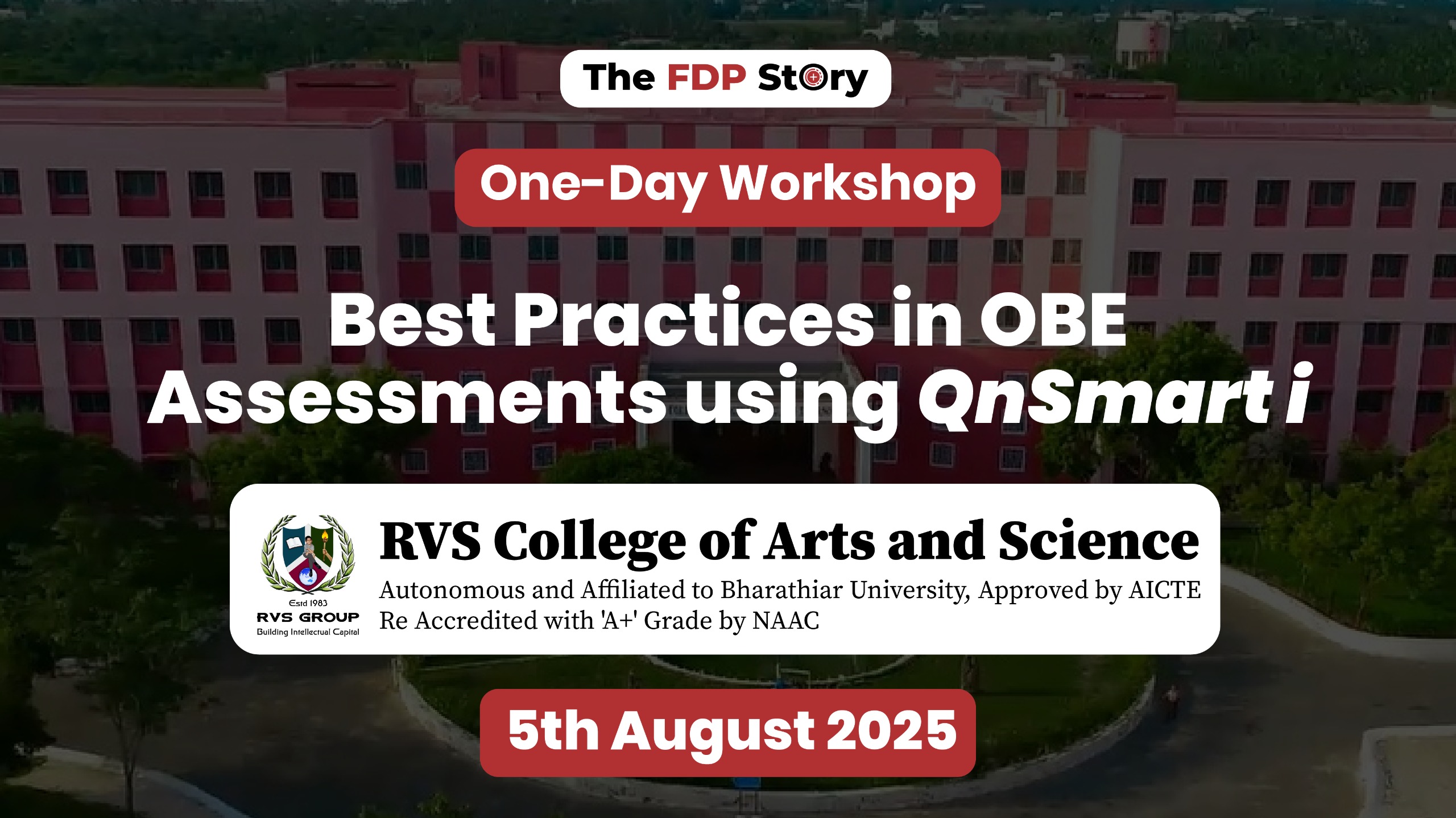
The Internal Quality Assurance Cell (IQAC), in collaboration with the […]
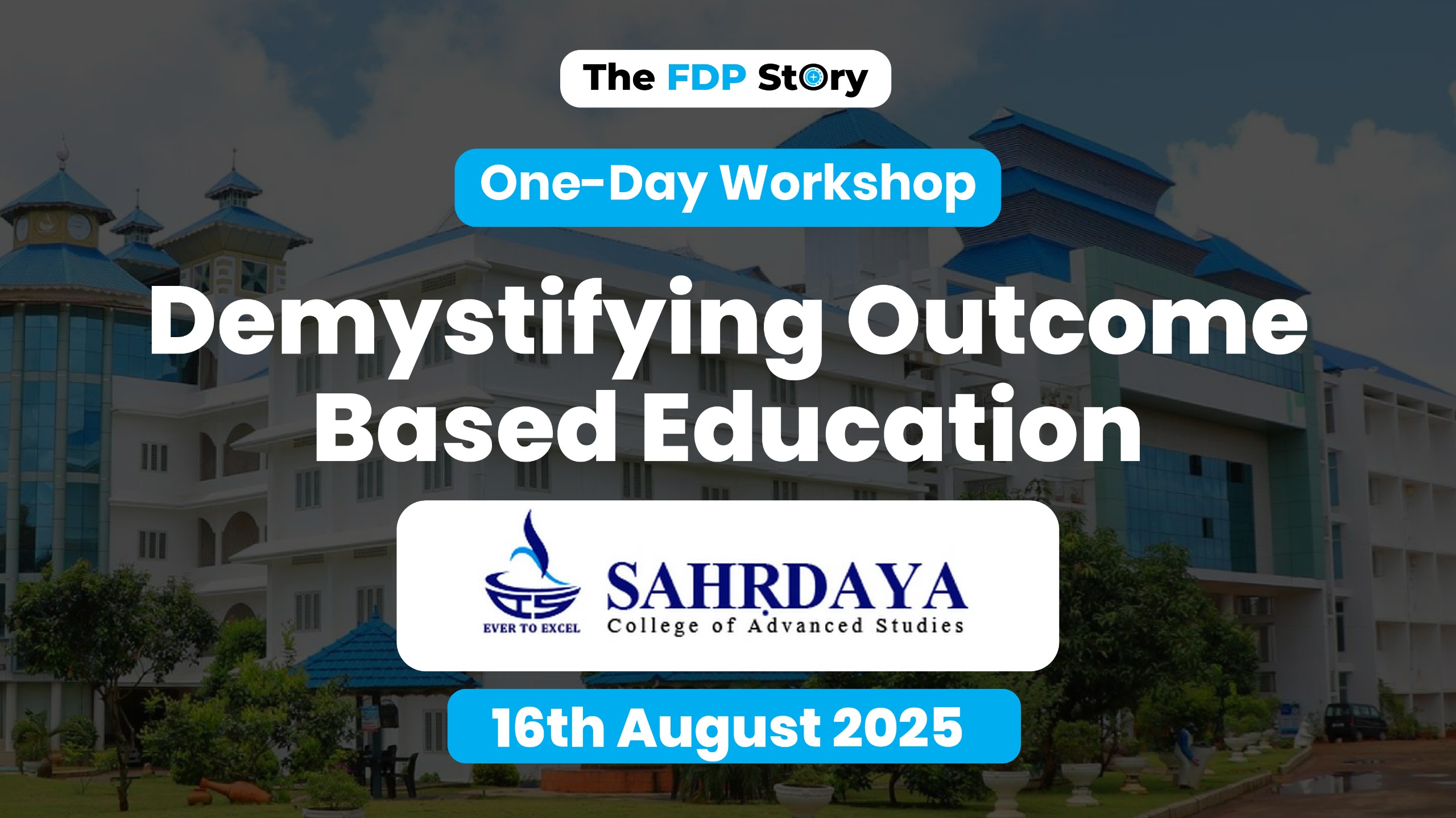
A one-day workshop on Demystifying Outcome-Based Education (OBE) was successfully […]
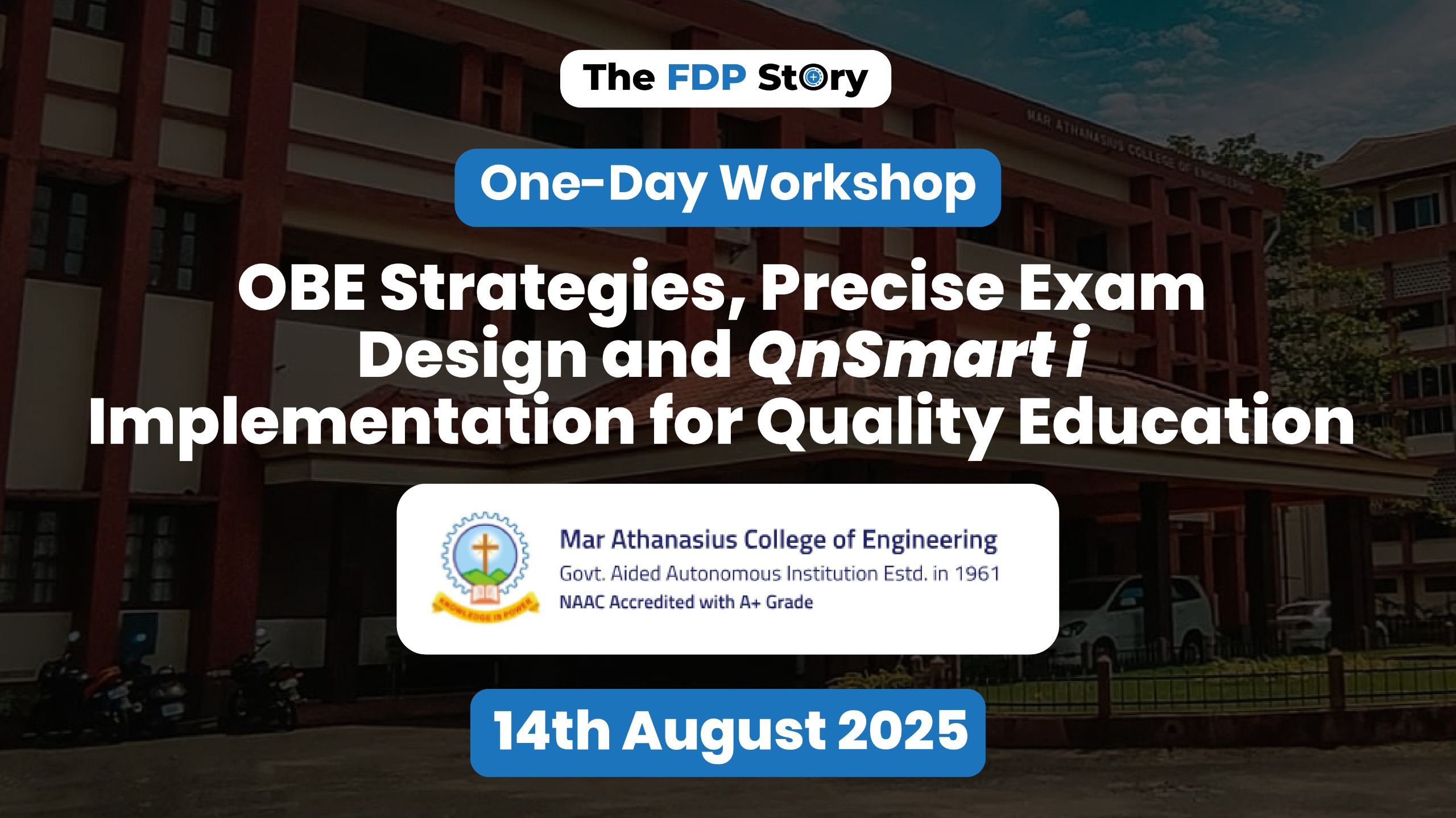
As part of Mar Athanasius College of Engineering’s continuous pursuit […]
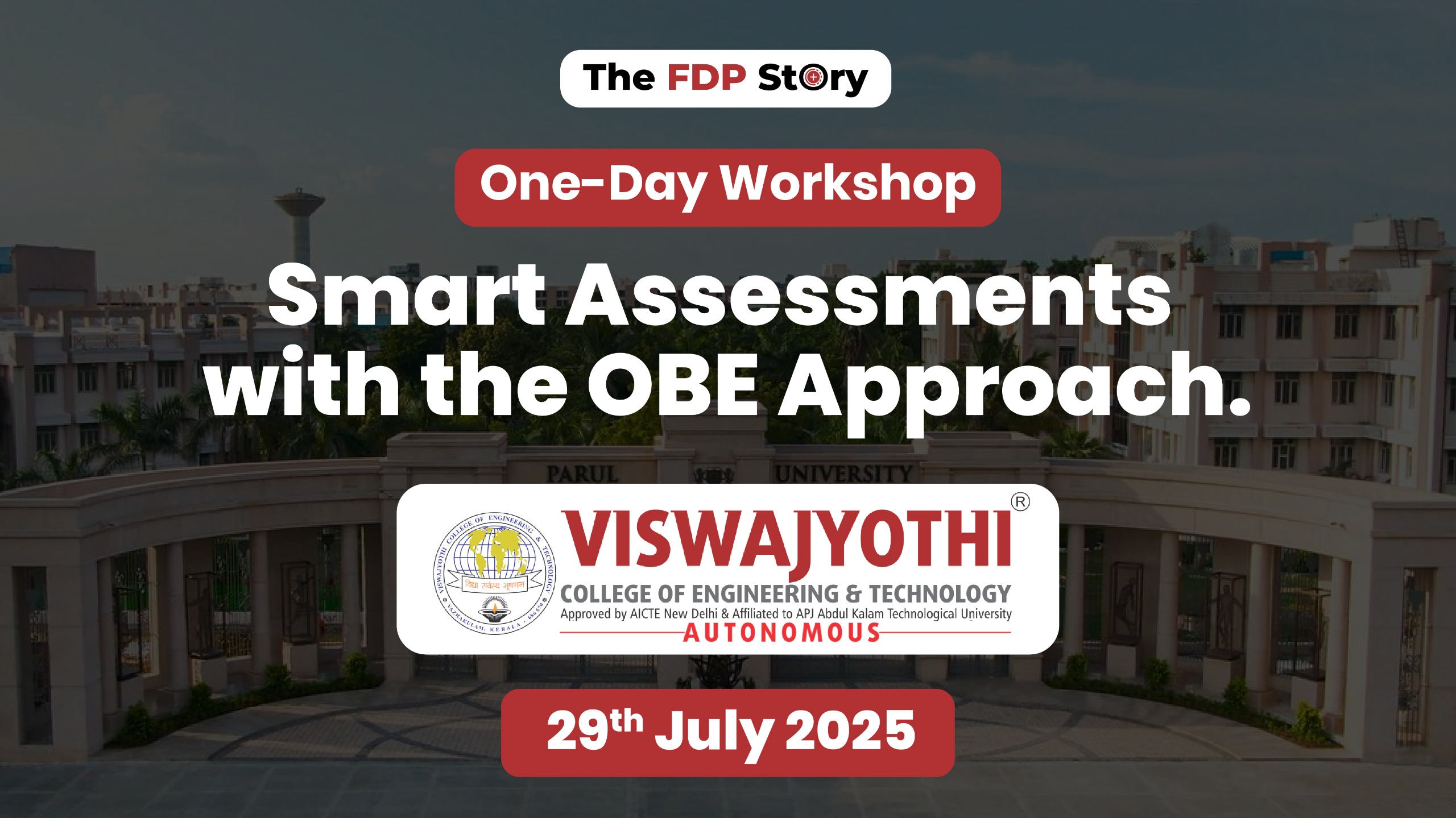
A one-day workshop on Smart Assessments with the OBE Approach […]
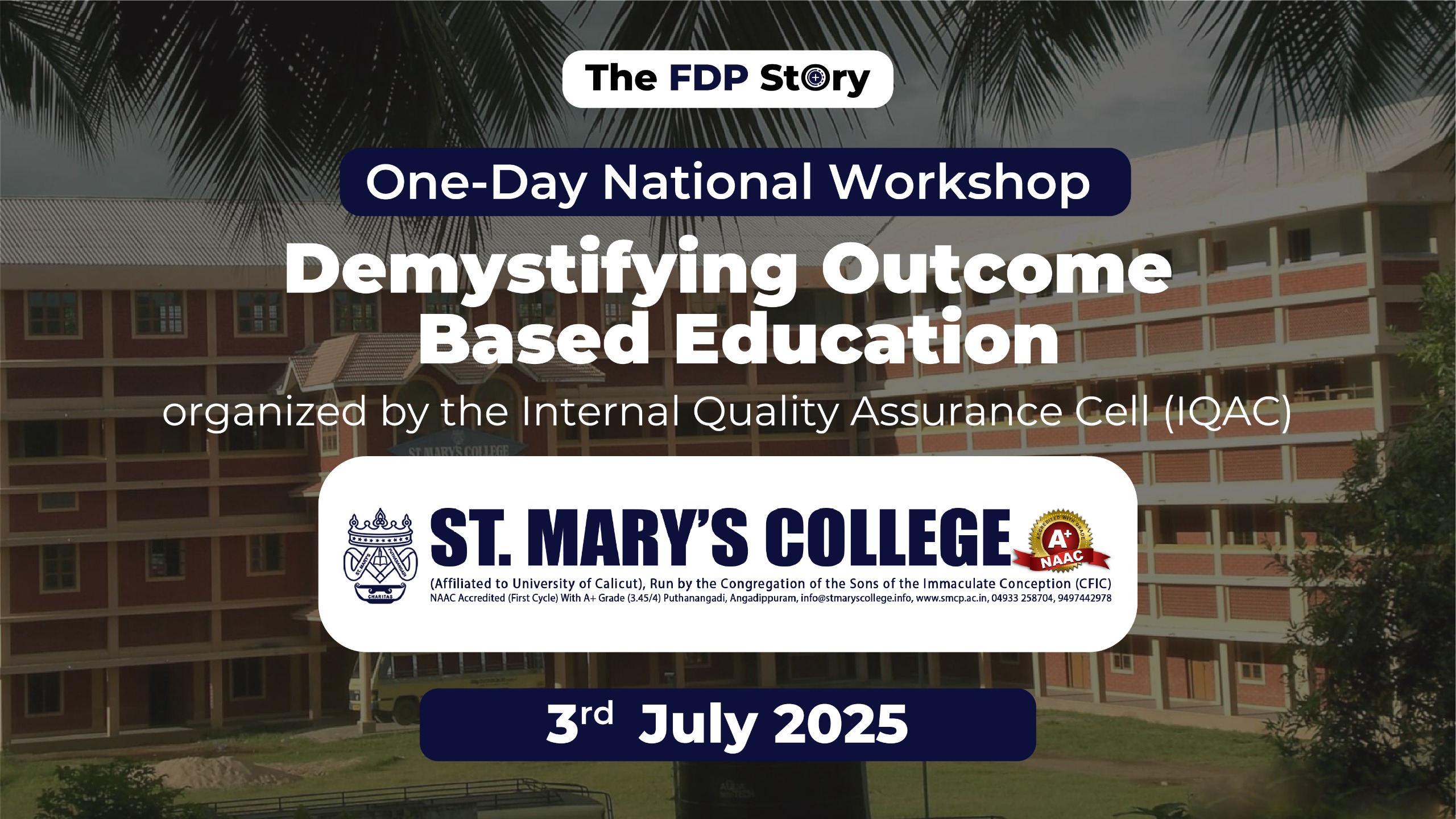
A one-day national-level workshop on Demystifying Outcome-Based Education (OBE) was […]
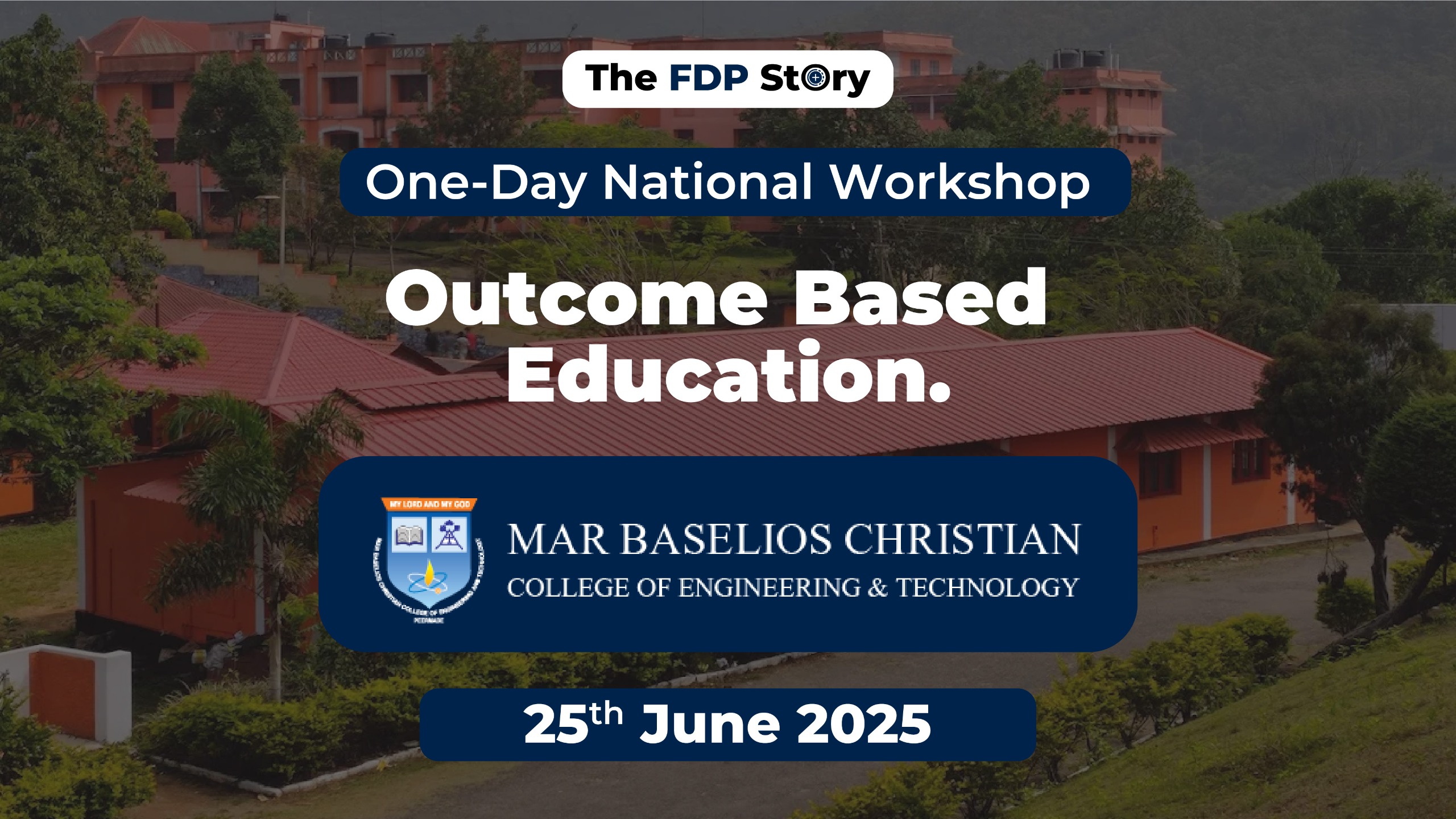
The Faculty Development Programme on Outcome Based Education (OBE) was […]

St. John Group of Institutions, under the Aldel Education Trust, […]
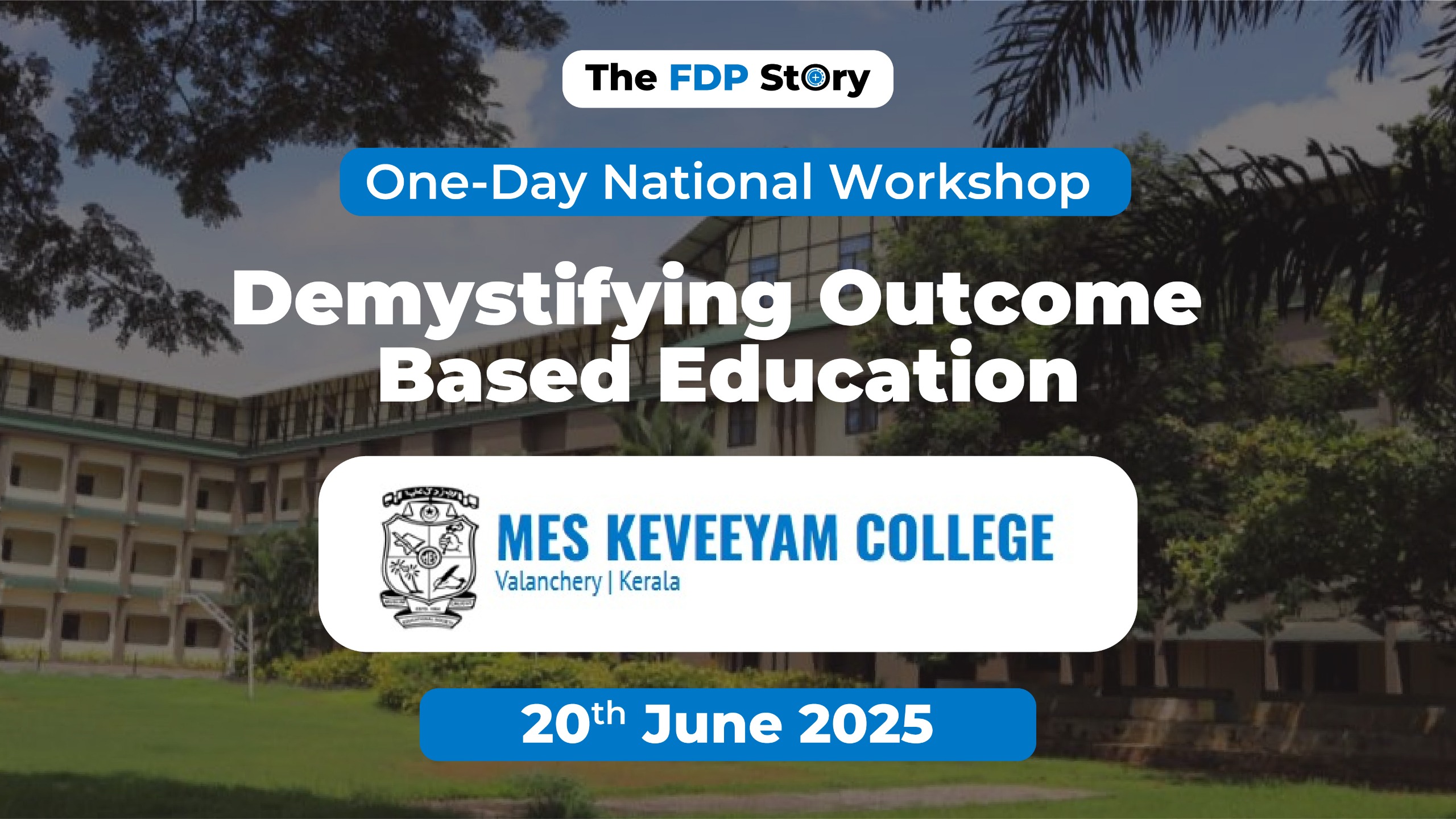
MES KEVEEYAM College, Valanchery, Malappuram, successfully hosted a One-Day National […]

As part of Parul University’s continued commitment to enhancing academic […]
Leave A Comment